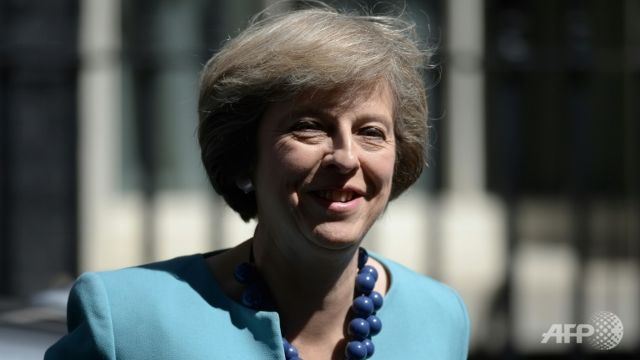UK will have 'control over borders' after Brexit: PM May
 |
| British Prime Minister Theresa May took office on July 14. (AFP/Oli Scarff) |
"The referendum vote was a vote for us to ... bring control into our immigration system. I'm clear that is part of what we need to deliver," she told Sky News in an interview. "We will be able to have control over our borders, of our laws."
German leader Angela Merkel has warned Britain will not be able to remain in the EU's single market while "cherry picking" the terms - including over the free movement of labour - and May on Sunday appeared to suggest she would be willing to quit the trade zone.
"Often people talk in terms of, somehow we're leaving the EU but we still want to keep bits of membership of the EU," she said. "We're leaving, we're coming out, we're not going to be a member of the EU any longer."
May has come under increasing pressure to reveal more detailed plans about her Brexit strategy, and promised to do so during a series of speeches in "the coming weeks".
"When people voted in the referendum on the 23rd of June, they voted to leave the European Union, but they also voted for change and this year, 2017, is the year in which we start to make that happen," she told Sky News.
'NOT MUDDLED AT ALL'
The prime minister, who took power after David Cameron resigned in the wake of the Brexit vote, stressed that Britain could still secure favourable access for businesses trading within the EU, although critics warn that negotiations will be fraught and complex.
"We will be working to get the best possible deal in the trading relationship with the EU," she said.
She also rejected last week's parting shot delivered by Ivan Rogers, Britain's outgoing top EU ambassador, that the government didn't have a clear plan.
May said her "thinking on this isn't muddled at all" and accused the previous administration of not preparing a strategy in case of Brexit.
May has vowed to activate Article 50 of the Lisbon Treaty, triggering a two-year period in which Britain will negotiate its departure from the EU, by the end of March.
If no deal is reached, Britain will automatically leave the EU's institutions, with reciprocal tariffs likely placed on businesses in the UK and the EU.
What the stars mean:
★ Poor ★ ★ Promising ★★★ Good ★★★★ Very good ★★★★★ Exceptional
Latest News
More News
- Russian President congratulates Vietnamese Party leader during phone talks (January 25, 2026 | 09:58)
- Worldwide congratulations underscore confidence in Vietnam’s 14th Party Congress (January 23, 2026 | 09:02)
- Political parties, organisations, int’l friends send congratulations to 14th National Party Congress (January 22, 2026 | 09:33)
- 14th National Party Congress: Japanese media highlight Vietnam’s growth targets (January 21, 2026 | 09:46)
- 14th National Party Congress: Driving force for Vietnam to continue renewal, innovation, breakthroughs (January 21, 2026 | 09:42)
- Vietnam remains spiritual support for progressive forces: Colombian party leader (January 21, 2026 | 08:00)
- Int'l media provides large coverage of 14th National Party Congress's first working day (January 20, 2026 | 09:09)
- Vietnamese firms win top honours at ASEAN Digital Awards (January 16, 2026 | 16:45)
- ASEAN Digital Ministers' Meeting opens in Hanoi (January 15, 2026 | 15:33)
- ASEAN economies move up the global chip value chain (December 09, 2025 | 13:32)
















 Mobile Version
Mobile Version